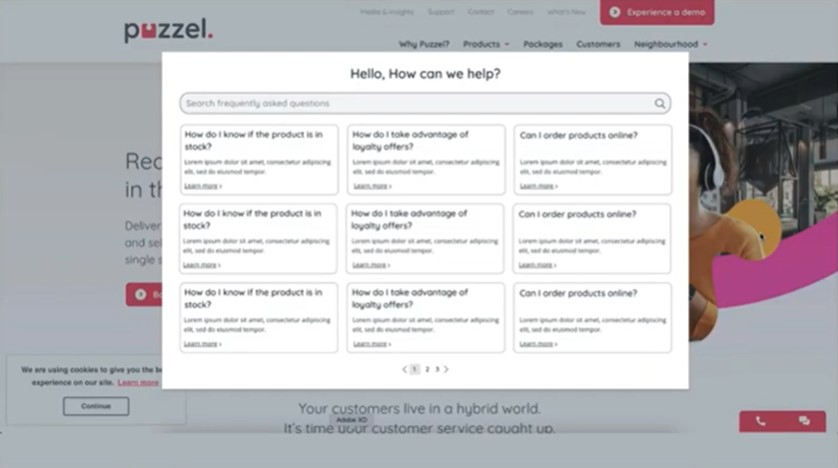Self-service done well is a win-win-win.
It allows customers to solve their queries autonomously, lowers employee workloads, and cuts business costs.
Yet, it is not easy to develop high-performing self-service systems. After all, bots take time to build, self-service portals have a limited scope, and proactive problem-solving can cause confusion.
Of course, each use case has its merits, especially as conversational AI gathers momentum. Nevertheless, there is an easier way to self-serve many queries and deliver seamless experiences: a customer-facing knowledge base.
A Knowledge Base Is Not Just an Agent Support Tool
According to a Forrester study, customers prefer knowledge bases over all other self-service channels.
Yet, many only consider the knowledge base as an agent assistance tool, offering service teams an invaluable resource to fall back on when unsure how to answer customer queries.
Indeed, the agent use case has come increasingly into focus since the switch to hybrid work, with in-person support falling to the wayside.
However, presenting a knowledge base to customers offers an especially exciting opportunity.
Just consider the current contact centre climate. High contact volumes, stretched resources, and new digital-first customer preferences are wreaking havoc.
By flipping around a well-managed agent knowledge base and adding a customer view, businesses can maximise their investment, solve many queries online, and enhance digital experiences.
Simply upgrading the FAQ page will help secure these outcomes. Yet, businesses may also create eye-catching overlays – like in the example below.

Here, the most frequently asked questions come at the top of the first page, although it is also possible to adjust the order, depending on the webpage.
Moreover, customers can also take advantage of NLU-powered search to ask something specific.
In the case of Puzzel’s knowledge base solution, the search also takes advantage of machine learning technology. As such, it begins to understand, over time, the most valuable knowledge article related to particular queries.
Meanwhile, users can zoom into specific articles, go back, and search again. When zoomed in, customers may access helpful images, videos, and attachments.
Other critical features include an article management portal to build knowledge templates, open categorisation, and embedded KPIs to track the value of individual articles.
The extent of most providers’ core capabilities stops here. Yet, Puzzel pushes the boat out further.
A More Innovative Approach to Customer Knowledge Base
Within Puzzel’s extensive CCaaS portfolio lies its Digital Engagement solution. By aligning this with a customer knowledge base, businesses may enhance online customer experiences.
How? First, consider how the digital engagement solution works. It analyses onsite behaviour, gauges intent, and triggers help actions to improve customer journeys.
One such action is proactively offering relevant knowledge articles to customers through a live chat widget when their experience seemingly hits a stumbling block.
During a purchase or renewal journey, this innovation may deliver considerable value. After all, with this layer of support, companies can safeguard customer spend.
Yet, the knowledge does not always have to pop up. Following their journey, the chat widget will create a list of relevant knowledge articles ready for when the customer chooses to press the support/help icon.
As Alexander Lunde, Director of Web Experiences at Puzzel, tells us:
“Based on where the customer is on the webpage, the consumer knowledge base presents the most relevant articles based on filters like sections, categories, tags, and search results.”
As a result, customers may reap the benefits of an automated personal assistant as they navigate tasks across the organization’s website.
Moreover, pop-ups and various views of the customer knowledge base as easily customizable, allowing businesses to tailor these to meet the look and feel of their websites.
Best Practices for Implementing a Customer Knowledge Base
Of course, converting an agent knowledge base into a customer self-service tool is not as simple as tagging articles for public visibility.
Indeed, some content initially crafted for agents may include private information or terminology that customers cannot easily comprehend.
Moreover, agent knowledge articles may reference internal systems and processes, which customers do not need to know.
As such, creating separate agent and customer views of the knowledge base is best.
Yet, this is just one best practice to consider. Others include:
- Creating a Style Guide – This ensures that knowledge articles have a unified format, which makes them easy for customers to scan and exudes professionalism. Developing a separate guide for agent knowledge also has many benefits.
- Repurposing Visual Content – Many businesses have already developed helpful how-to videos and imagery to improve user experiences. Adding these to the customer knowledge base will draw a bigger audience to this and add colour to the written words.
- Monitoring and Reviewing KPIs – Assess knowledge KPIs and track what customers enter into the search bar. Doing so highlights areas for improvement and crucial knowledge gaps. Also, give expiry dates to individual pieces of knowledge to ensure that the team regularly reviews their accuracy.
One final consideration is to think about: why do customers need this knowledge? Is it smoothing over a friction point in the user experience that does not need to be there?
If so, it is perhaps best to share this with the most appropriate department. They can then remove the pain point altogether and enable an effortless experience.
Discover More About the Puzzel Knowledge Base
Achieving leader status in the latest Frost & Sullivan CCaaS Radar for Europe, Puzzel is supporting more and more businesses in delivering excellent service experiences.
Moreover, it has a strong foothold in knowledge base technology, aligning the software with its Digital Engagement portfolio to help clients create unique, forward-thinking online journeys.
To find out more, visit: visit Puzzel.







